Within the context of increasing pressure on mental and physical health care, scientists are increasingly exploring technological solutions that enable personalized, approachable and rapid diagnostics. University of Cincinnati researchers recently developed an advanced “lab-on-a-chip” technology that can measure stress hormones such as cortisol and DHEA via saliva. This innovative point-of-care test provides healthcare providers with objective data to identify stress-related conditions such as depression and anxiety early.
The technology uses a compact, portable device into which a patient can easily place a saliva sample. Within minutes, the data is transmitted via a reader to a smartphone or other mobile device. This reduces diagnostics that would normally take days to complete to minutes - completely non-invasive and suitable for home use. This makes the system ideally suited for application in mental health care, where timely intervention is crucial.
Biomedical measurements
The test combines psychometric assessments - such as questionnaires - with biomedical measurements of cortisol and DHEA. This provides a valuable complement to existing screening methods, which often rely on patients' self-reports. According to the researchers, this type of objective biomarker analysis can play a valuable role in identifying patients who might otherwise remain under the radar, for example due to poor disease understanding or social stigma.
The research was published in several journals and also highlights the broader applicability of the technology. In addition to stress diagnostics, the scientists also investigated using the chip to measure troponin, a protein released during heart damage. By measuring troponin levels quickly and reliably with just a drop of blood, patients can be proactively monitored after a heart attack - an essential step in preventing new cardiovascular incidents.
Wider deployment
The technology is thus more widely applicable within primary care and emergency care, and is a valuable link in the development of hybrid care models in which digital tools play a central role. The researchers stress that collaboration with clinical psychiatrists and further validation through trials is needed for large-scale implementation. Nevertheless, this new generation of wearable diagnostics is expected to contribute to faster care, better outcomes and greater patient direction.
Home tests
Last year, a test that allows cancer patients to self-monitor their blood at home was approved in the UK. Thanks to that home test, these patients need to travel to the hospital less often. The device, about the size of a small printer, requires only a painless finger prick and sends the results directly to the hospital. The home test not only provides benefits for patients, such as less physical and mental strain, but also may increase efficiency in hospitals by reducing the need for staffed blood collection centers.
In 2023, we wrote about an easy-to-use home test that proved effective for early detection of kidney damage. That test detects protein in urine, an indicator of kidney damage that often goes unnoticed until severe symptoms appear. Early detection allows for timely intervention, often with lifestyle modifications and medication, to prevent progression to kidney failure and cardiovascular disease.









